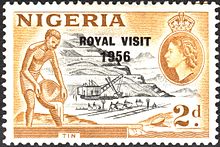Monarchy of Nigeria (1960–1963)
| Queen of Nigeria | |
|---|---|
 | |
 | |
| Details | |
| Style | Her Majesty |
| Formation | 1 January 1960 |
| Abolition | 1 October 1963 |
From 1960 to 1963, Elizabeth II was Queen of Nigeria: Nigeria was an independent constitutional monarchy. She was also the monarch of the other Commonwealth realms, including the United Kingdom.
Nigeria became independent on 1 October 1960 under the Parliament of the United Kingdom's Nigeria Independence Act. The Queen was head of state, though her constitutional roles in Nigeria were mostly delegated to the Governor-General of Nigeria.[1]
The retention of the monarchy was unpopular with Nigerians, and all political parties in Nigeria agreed that the country should be a republic.[1] Nigeria severed its link with the British monarchy, and adopted the President of Nigeria as head of state, on 1 October 1963.[1]

The Queen visited Nigeria twice: 28 January–16 February 1956 and 3–6 December 2003, the latter time to attend the Commonwealth Heads of Government Meeting 2003.[2]
| Queen | ||||
| Name | Birth | Death | Consort | Heir apparent |
|---|---|---|---|---|
| Elizabeth II | 21 April 1926 | Prince Philip, Duke of Edinburgh | Charles, Prince of Wales | |
| Titles |
|---|
| Elizabeth II 1 October 1960 – 1 June 1961: By the Grace of God, of the United Kingdom of Great Britain and Northern Ireland and of Her other Realms and Territories Queen, Head of the Commonwealth, Defender of the Faith 1 June 1961 – 1 October 1963: Elizabeth the Second, Queen of Nigeria, and of Her other Realms and Territories, Head of the Commonwealth[3] |
References
- ^ a b c Chika B. Onwuekwe (2003). "Constitutional Development, 1914–1960: British Legacy or Local Exigency?". In Adebayo Oyebade (ed.). The Foundations of Nigeria: Essays in Honor of Toyin Falola. Africa World Press. pp. 172–173. ISBN 1-59221-120-8.
- ^ "Commonwealth visits since 1952". Official website of the British monarchy. Royal Household. Retrieved 8 November 2015.
- ^ Royal Styles and Title Act, 1961, quoted in Benjamin Obi Nwabueze (1982). A Constitutional History of Nigeria. C. Hurst & Co. p. 86. ISBN 0-905838-79-3.
